
Google is constantly working on algorithm updates.
And the most common SEO mistakes, made by newbies and black-hats alike, are the targets in Google's sights.
Every little algorithm tweak, like the one we experienced in March 2018, is meant to wipe out low-quality content and get the highest-quality content to the top of the SERPs.
We get "what am I doing wrong?" questions from SEOs every day.
When it comes to SEO, you just can’t afford to make mistakes.
They'll cost you precious keyword rankings and organic traffic—ultimately costing you your time, money and energy.
For example, many SEOs keep using the same old techniques over and over again, then wonder why they aren't ranking well in search engines.
This often occurs when you think you know exactly the right steps to take—and then take those and only those steps. Even if they work, you end up lacking diversity in your results, only ranking for the same few keywords, only getting backlinks with the same exact anchor text, and so on.
To Google and other search engines, this looks a bit unnatural. They might think you're only focused on SEO (not on the quality content they prize in the SERPs) or that you're trying to manipulate the system with some black hat scheme.
Either way, not good. You're in for a penalty or, at the very least, SERP failure.
You'll need to make sure you're using the right strategies, diversify your strategies and, of course, avoid the 11 top SEO mistakes we've identified below.
1. Over-optimizing Your Anchor Texts
This is by far the most common problem made by online marketers who are focused on building quality backlinks.
We all know that backlink anchor text matters. Some of us mistakenly think that a successful linkbuilding campaign involves getting hundreds of backlinks using the same exact anchor text.
And that this anchor text should be your most important keywords. So, if I wanted to rank for "buy organic dog food," I would want to get thousands of backlinks embedded in the keyword phrase "buy organic dog food."
Um, no.
If your website has backlinks with a lot of rich anchor texts like this, it's more likely that your rankings and traffic will drop. This looks like you've got a link scheme going and Google may slap you with a penalty.
An Example of Over-optimized Anchor Texts
When you do a search on Google for “parenting tips," the website betterparenting.com is nowhere to be found in the first 10 pages.
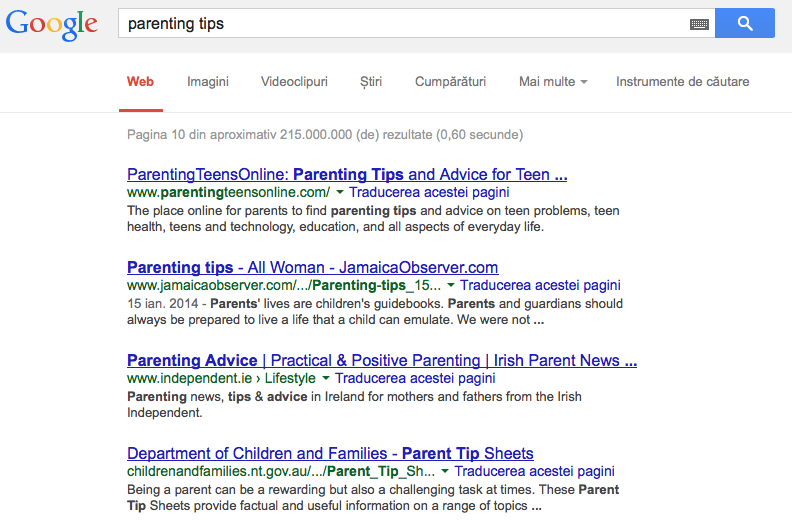
If you do the same search on Yahoo, the website is ranked right on the first page.
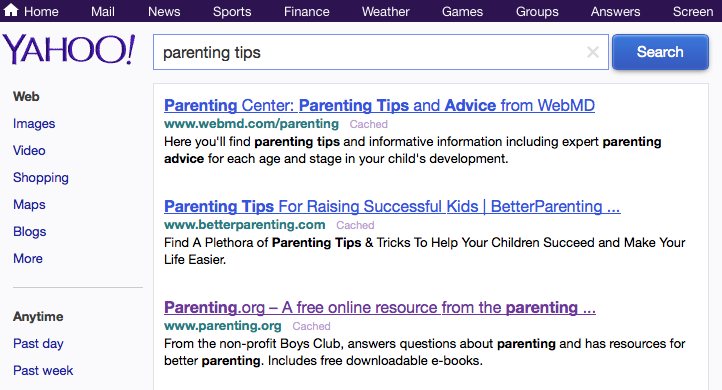
Without a doubt, the website has been penalized by Google. Let’s dig deeper and find the reason.
From the report below, we can see that the website has over-optimized their backlink anchor text for the keywords “parenting” and “parenting tips.”
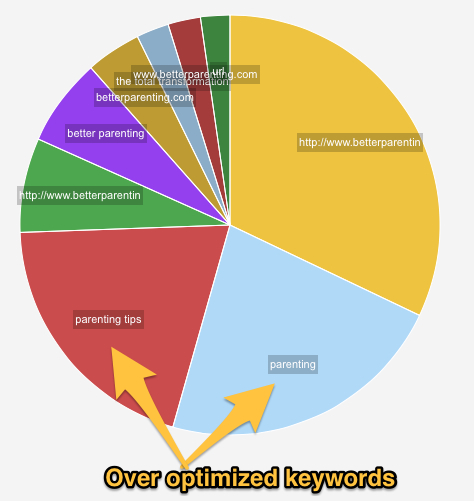
If we search even more with Ahrefs, we can see that the most common words used as anchor texts are “parenting” with 40% and “tips” with 14%.
Yup, without a doubt, this website has been penalized by the Google Penguin update, but it’s still ranking in Yahoo.

How to Get Valuable Anchor Texts
Rather than striving the have this important keyword in every anchor text, you'll want to rotate and mix your keywords to make it all look natural.
Think about it this way. When people naturally decide to link to your website, they'll all end up using different anchor texts, at least with some slight variation. The most common anchor text that will appear repeatedly in a link profile is your own brand/company name.
For example, it's very common that people link back to SEOptimer and embed the link within our brand name: SEOptimer.
When you build backlinks to your website, try to use your brand name as the anchor text 80% of the time, and your rich anchor texts only 20% of the time. Take it a step further and, within that 80% using the brand name, use different combinations of your brand name:
- Yourwebsite.com
- Yourwebsite
- Your Website
- Your Website.com
- www.yourwebsite.com
With diversity in mind, you'll be able to build valuable backlinks and avoid the SEO mistake of over-optimizing.
2. Building Too Many Links to Your Homepage
No website in the world will look natural if it only has links pointing to its homepage.
If you're serious about SEO and you want results, always remember that your goal is to make your backlink profile look as natural as possible.
Many digital marketers get too excited about ranking their homepage in the SERPs, so they forget to (or just choose not to) build backlinks to other pages. Instead of building hundreds of links to your homepage, you should split these links up and have some deliver readers to your blog posts and other site pages.
This is one of the most important factors Google considers when ranking websites.
Let’s check BetterParenting.com again, shall we?
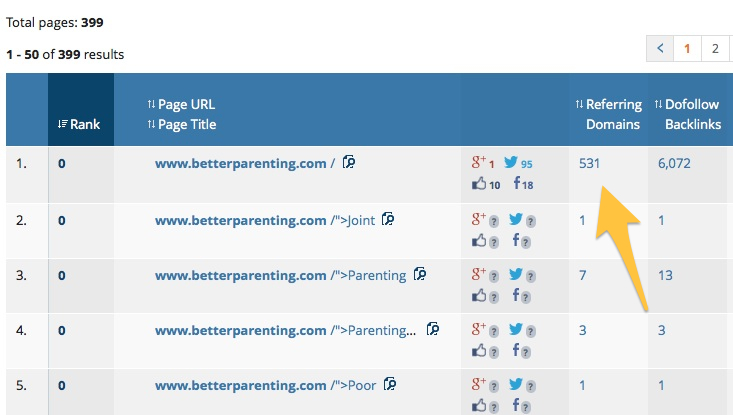
Can you see a pattern? 530 links to the homepage, and the second-most-linked page has only 7 links.
It's like calling Google and telling them that all you care about is your homepage.
This is a major mistake many SEO experts are still making every day.
3. Writing Useless and Thin Content
When people land on your website, most of the time they'll be looking to find a solution to a specific problem, or an answer to a specific question.
Your website must have the right solution or answer. If it doesn't, they'll bounce back out of your page and to another SERP result right away. This will kill your bounce rate and, in turn, let Google know that people aren't finding what they need on your website.
Thus, Google will kick you out of the SERPs.
Nobody likes useless pages with thin content, and neither does Google.
So, what do you need to provide? Good content is a matter of both quality and quantity.
Quality content should have directly address whatever is being requested by typing in the chosen keywords.
If we think back to the keywords "buy organic dog food," content for this topic should tell readers specifically how to buy organic dog food and anything relevant to making that decision: where to buy, how to buy, what to buy, and so on.
Here's where quantity comes in. If you only write 200 words on the topic, then it’s virtually impossible to write quality content. You won't be addressing the question in any depth, or providing readers with everything they need.
As for a specific minimum word count, there have been endless discussions about the posting length. Lots of people used to say 500 words—now they're saying anywhere between 1,000 and 3,000 words.
Just one reason why Wikipedia ranks at the tops of the search engine results page is because it provides long, detailed articles. Most of these have at least 2,000 words.
I would personally recommend 1,000 words at a bare minimum, but with the caveat that you always keep value at the forefront of your mind. After 1,000 words, ask yourself: Is there more to say on this topic? If the answer is yes, then keep on writing.
4. Not Keeping Track of Your Backlinks
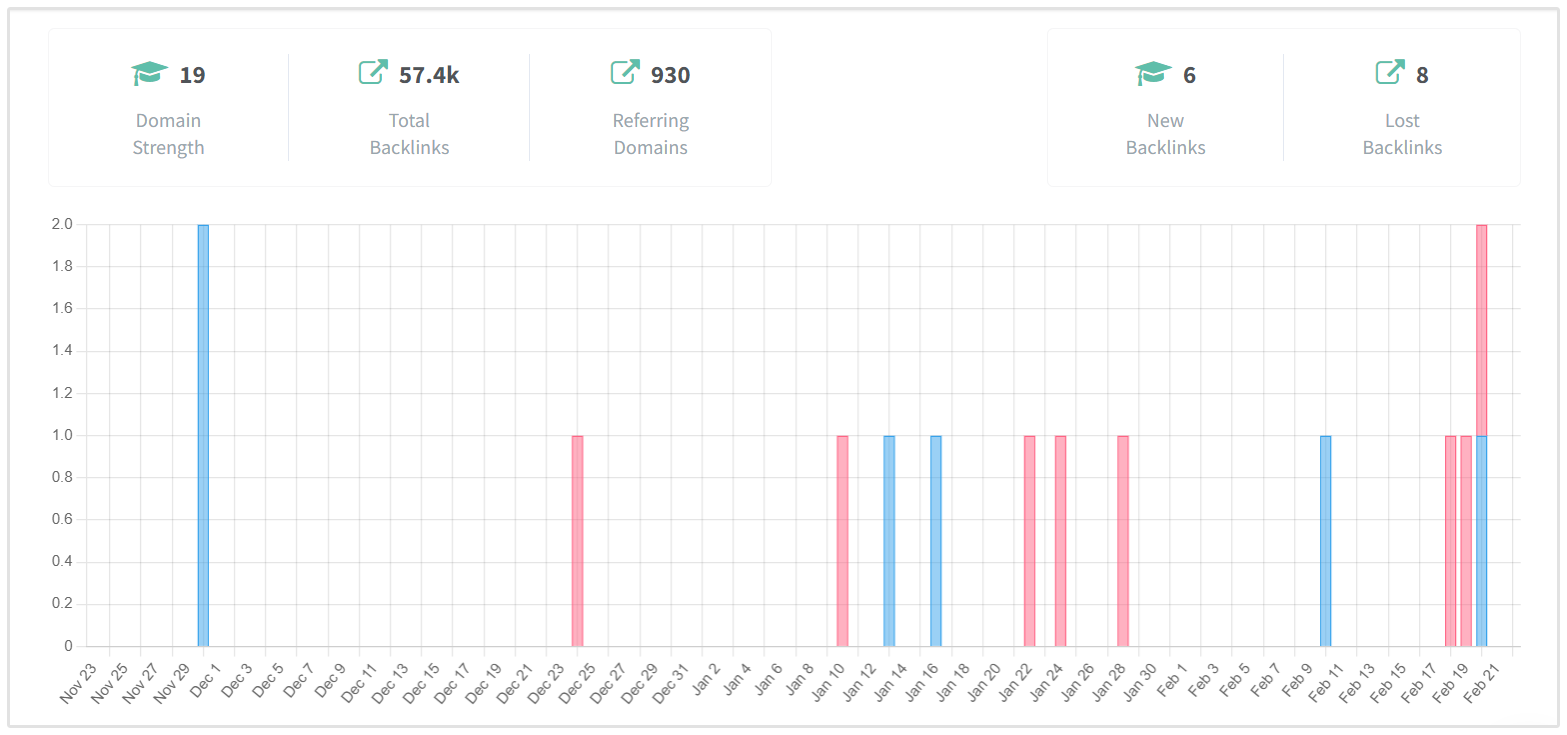
Backlinks are arguably still the most important factor to rank in search engines, and they probably will be for a while.
This is why it’s vital to build backlinks. Once your valuable backlinks have been identified, try to replicate those links. You can also spy on your competitors in the SERPs to see what backlinks they've been earning, then replicate those links.
Now, to the point of this SEO mistake. A lot of SEOs concentrate their efforts so much on building backlinks that they forget to analyze the links that they currently have.
Here are some benefits of tracking your backlinks:
- Identify the best backlinks and replicate them
- Know what links drive the most traffic
- Know when somebody adds a new backlink to your website
- Know when there's a change to an existing backlinks (for example, if it's made nofollow or removed completely)
- Know if an unethical competitor has started a negative SEO campaign against your website
- Be able to identify which negative backlinks need to be disavowed (and to create a disavow file for Google)
To keep track of your backlinks and do all of the above, you can use the SEOptimer SEO tool.
5. Build Too Many Backlinks in a Short Period of Time
You don’t need to build too many backlinks to your website in order to rank well. It used to be a numbers game, so much so that SEOs would pay big bucks to have thousands of links scattered on the net like seeds in the wind.
Now, thanks to several years' worth of Google updating their algorithms, what matters is the quality of your backlinks.
One incredible, in-context backlink from an authoritative website in your niche is worth more than 1,000 paid-for directory and comment links.
Actually, those 1,000 backlinks might not have any positive effect at all. They might drag you down or earn you a nasty Google penalty. Google takes notice when 100 websites suddenly decide to link to a little website (worse yet, if all 100 websites are using the exact same anchor text).
Under what natural circumstances would 100 websites all decide to link to the same page at the exact same time? Very few. This raises a big red flag with Google.
(Of course, if you created some insanely powerful viral content that hundreds of websites just had to link to right away because it's such good content, then you'll get a free pass. In this situation, other factors will prove that the links were created naturally.)
All in all, instead of trying to get hundreds of spammy links, it's far more valuable to concentrate your efforts on getting links from authoritative domains in your niche.
6. Too Many Ads on Your Pages

Google tends to penalize websites that have many, many ads above the fold.
Try to keep your website clean and easy to navigate. Don’t use annoying pop-ups that appear the second people arrive on the page, or that linger on the page and are impossible to click away. This can increase your bounce rate.
Even if your CTR might be lower down and less visible, your user experience is much more important.
7. Website Speed
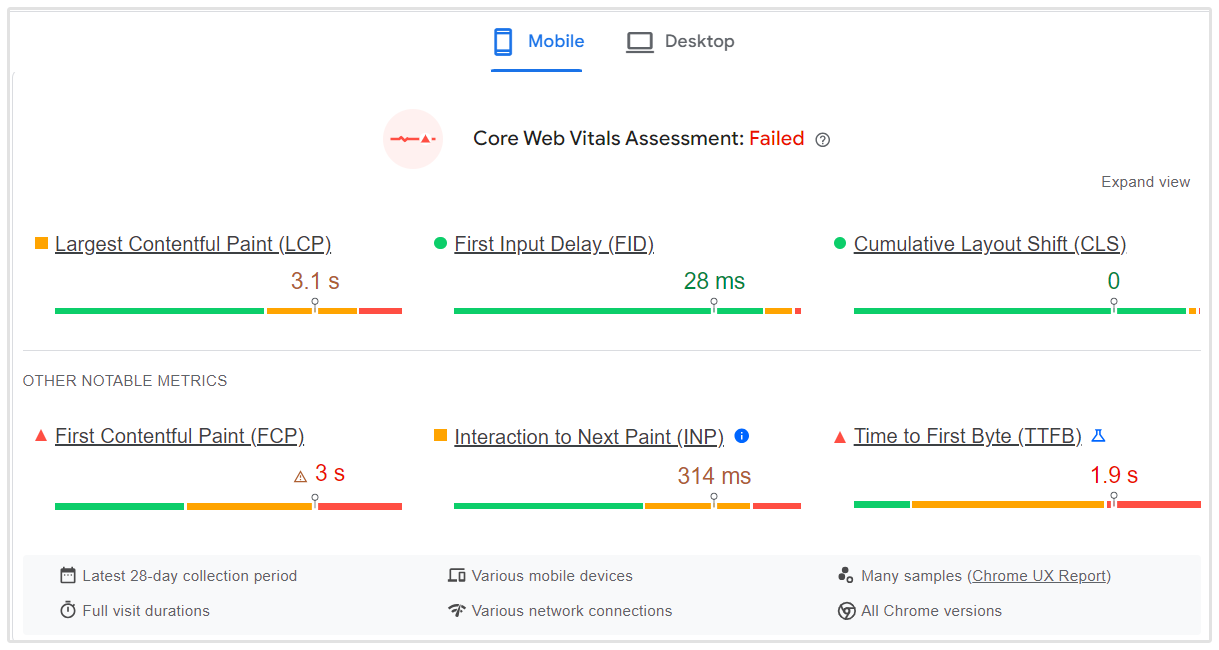
Yes, websites that load fast rank better.
People expect websites to load in two seconds, and have such ridiculously short attention spans that they'll quickly exit any page that doesn't.
Don’t use unnecessary plugins or scripts that can slow your website down. Optimize your images so they'll not massive and heavy. Here's the full list of things you can do to improve PageSpeed, provided by the SEOptimer tool:
- Avoid landing page redirects
- Enable compression
- Leverage browser caching
- Reduce server response time
- Minify CSS
- Minify HTML
- Minify JavaScript
- Eliminate render-blocking JavaScript and CSS in above-the-fold content
- Optimize images
- Prioritize visible content
You can use the Google PageSpeed Insights tool or PingDom Tools to assess your website's speed.
8. Ignoring On-page SEO
SEO is broken down into on-page and off-page SEO. Off-page mainly boils down to linkbuilding and social media.
On-page SEO is at least as important as your backlinks.
This is how you can tell Google what your content is about. You're essentially going to be learning the language that Google's spiders speak, so when they crawl through your pages they see all the valuable stuff and report back to their master that you deserve the #1 spot in the Google SERPs.
So, when you want to do SEO, always start with this ahead of everything.
These are the most important on-page factors at the moment, and you should build these into every page and and blog post:
- SEO-friendly URLs
- Title tags, meta tags and meta descriptions
- Add your main keywords in the first 100 words, but don’t exaggerate
- Include your main keywords in an H1 tag
- Long content. Write at least 1,000 words/post
- Keyword research and optimization
- Add alt tags to your images
9. Buying Links Without Using the Nofollow Attribute
Big brands have been caught and penalized because of buying links.
If you want to buy links or banners to your website, make sure you use the nofollow attribute.
Even in display advertising and paid sponsored posts, the nofollow link protects you from any negative effects buying links might have had.
10. Duplicate Content
Google values unique content and hates websites that have duplicate content.
First, make sure you're totally original and not copying any content from other websites. If you've hired writers to take care of your blog posts and other content, keep careful watch to ensure that no plagiarizing
or "content spinning" is taking place.
You can use CopyScape for this. Also, you check use this tool to check if your current content has been posted somewhere else and make sure nobody is plagiarizing your hard work.
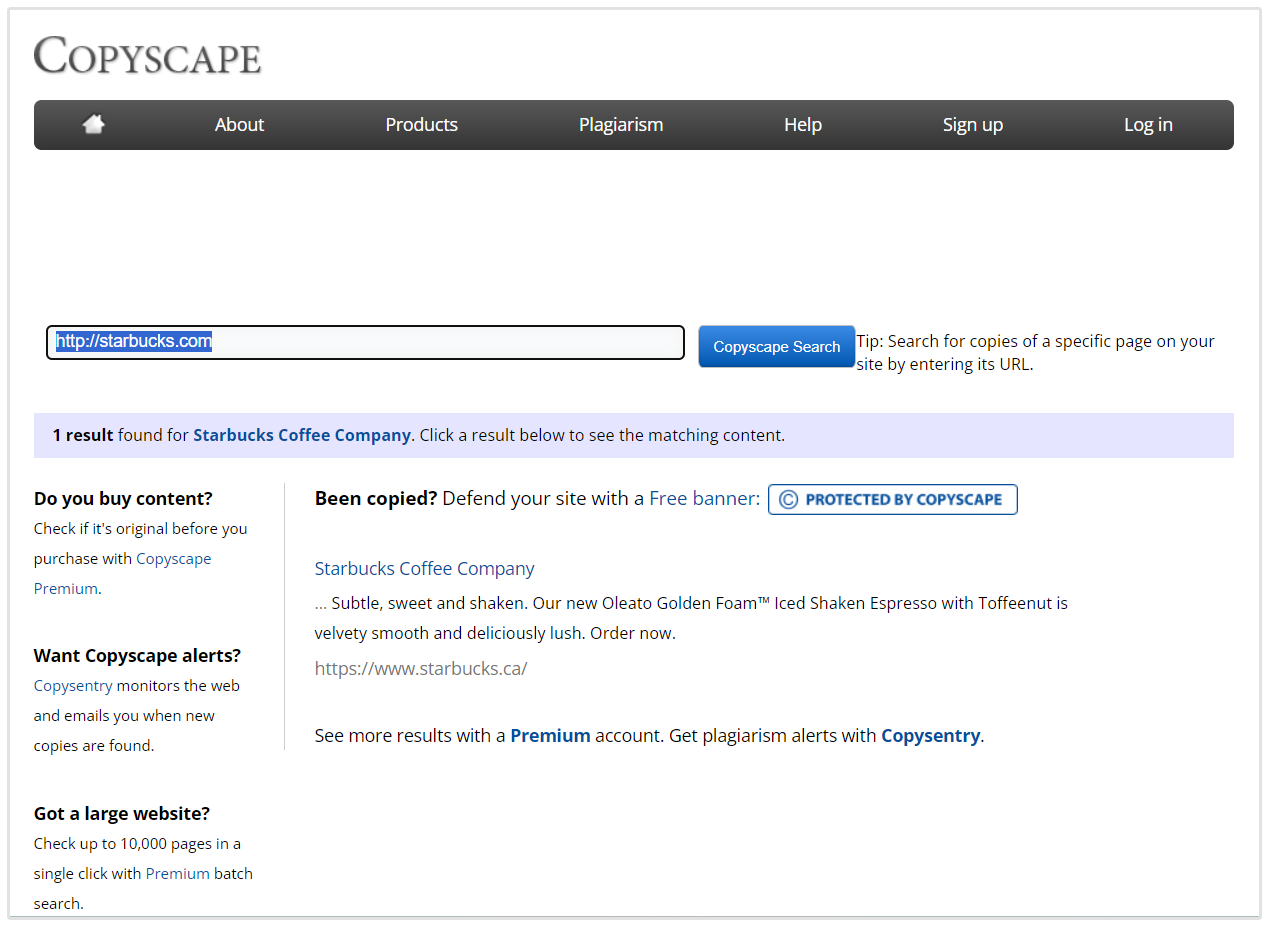
To avoid causing duplicate content on your own site unintentionally, don’t write about the same topic too many times. For instance, “Make money online” and “Make money online today.” You're bound to end up with overlapping content, so it's probably not going to help you rank for either set of keywords better.
11. Build Low Quality and Irrelevant Backlinks
Don’t believe anything you read on forums.
If your website has too many low-quality backlinks, it’s almost impossible to rank. As we've discussed, one link from an authoritative domain in your niche is more important than 100 low-quality ones.
These are the types of links you should avoid:
- Irrelevant links to your niche
- Sitewide links
- Backlinks from pages with very little content
- Links from pages that are suspected by malware
- Link exchanges and wheels
- Directories
If your backlinks profile has these links already, check our backlink removal guide.
Conclusion
If your website isn't ranking highly in Google, make sure you aren't doing any of the mistakes I've mentioned above—I can tell you from lots of experience, these 11 points are the places to start looking for an SEO problem.
Then, when you start any future SEO or linkbuilding campaigns, remember that everything has to look natural.
That's the game, so make sure you're following the rules!










